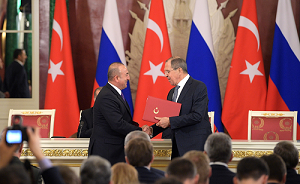Turkish Stream Moves Ahead
by Natalia Konarzewska
April 19, 2017
On February 1, Russia’s Federation Council, the upper house of parliament, ratified the inter-governmental agreement (IGA) on construction of Turkish Stream, a pipeline designed to carry Russian gas to Turkey and further to Europe. The bill was earlier approved by the Turkish parliament in December 2016 and by Russia’s State Duma, the lower house of parliament, in late January. Russia is also investigating means for transporting gas to southern Europe. In January, the Deputy Chairman of Gazprom’s Board Alexander Medvedev announced that Gazprom was interested in using the capacities of the Trans-Adriatic Pipeline (TAP) or ITGI-Poseidon to bring its gas to Europe.

Do Russian-Turkish Energy Relations Have a Future?
By Najia Badykova
December 9th, 2015, The Turkey Analyst
Despite sharp political disagreements, Russia and Turkey have in the past weathered difficult times, pragmatically handling their differences. However, the current crisis is substantially different from any other previous quarrel. In the current hostile environment between Ankara and Moscow, the idea of Turkey as a transit hub for Russian gas is unlikely to make any headway whatsoever. Yet Turkey and Russia remain interdependent. Reasonably, both will eventually re-engage and make efforts to safeguard common economic interests, including the now suspended Turkish Stream project. The result will depend on how soon they will be able to check and eventually defuse the tensions that are now rapidly building up.



